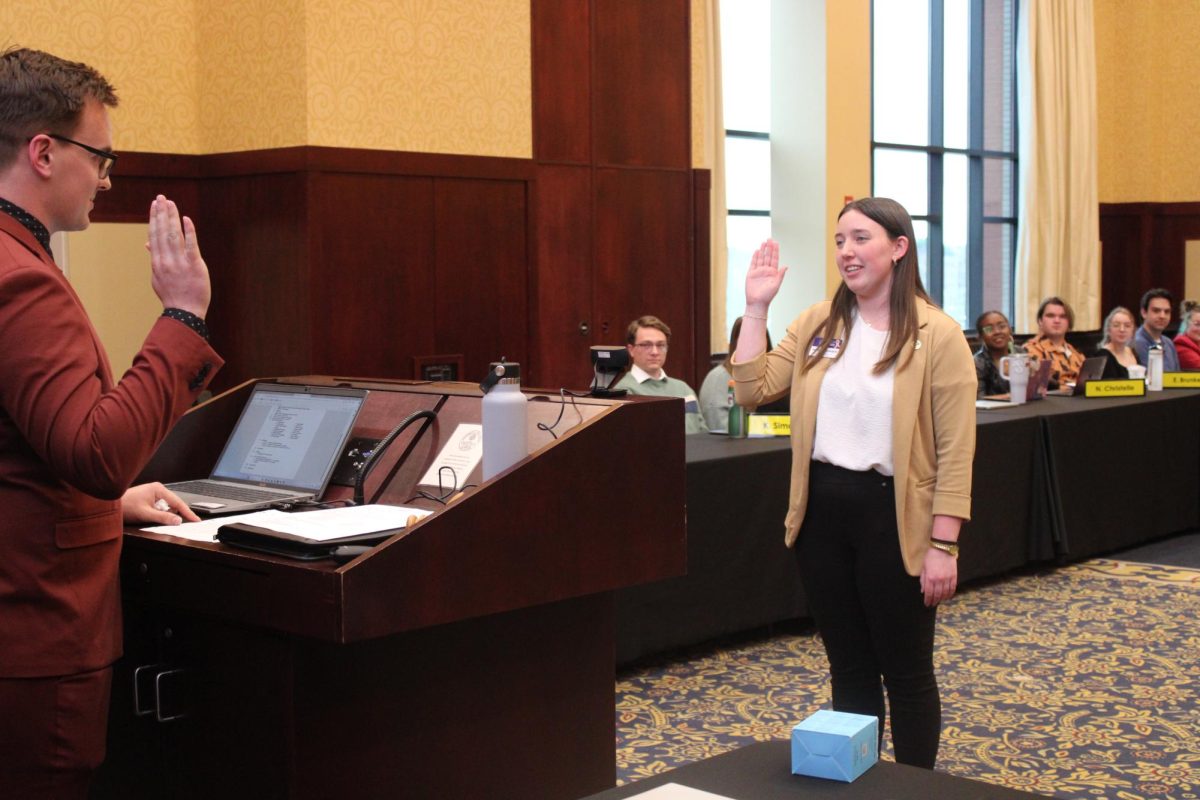In the college atmosphere, officials say 90 to 95 percent of general sexual assaults toward women happens from a man the woman knows.
In a non-college atmosphere, within the 18 to 25 age group, 75 percent of sexual assaults toward women are from a man the woman knows, said Dr. Susan Turell, UW-Eau Claire associate professor of psychology and coordinator of women’s studies.
| “Only rapists can prevent rape.” –Dr. Susan Turell Associate professor of psychology |
“I think that sexual assault is a serious issue on any college campus,” said Jodi Thesing-Ritter, a member of a group called Sexual Assault Task Force.
Sexual Assault Task Force (SATF) was started in the fall, under the direction of Turell, to create awareness and prevention of sexual assault on the Eau Claire campus and within the community.
“UWEC has the same concerns as other campuses around the country,” Thesing-Ritter said.
Sexual assault is a major issue at Eau Claire, Turell said. A CORE survey recently released by Health Services asked a few questions about sexual assault as it related to drinking. One question asked about forced sexual touching or fondling and unwanted sexual intercourse in the past year. The percentages from that question totaled to 9.3 percent, which is 966 students, Turell said.
The numbers reported from the Eau Claire survey were consistently higher than what was reported by a large comparison group of students around the country, Turell said.
SATF was started to help coordinate and expand the efforts made for students at Eau Claire regarding sexual violence, such as rape, child sexual abuse and dating violence, Turell said.
The group is a collaborative effort between the campus and the community, made up of about 30 people, Turell said.
The group is a mixture of students and representatives, both males and females, from various areas of the campus and community. There are representatives from places such as Counseling Services, Health Services, area hospitals, the district attorney’s office, Social Services and different community agencies, such as the Bolton Refuge House, Turell said.
“Students are certainly a part of it,” Turell said. “There are several students who come to the meetings. The idea is that we involve as many people as possible.”
A subcommittee, chaired by Thesing-Ritter, is working on sexual assault education and prevention. The subcommittee has been meeting bi-weekly.
“We welcome anyone interested in working on this issue,” Thesing-Ritter said.
One of the guiding principles of SATF is a commitment to a continuing evolution of improvement of services and programs, which the campus and community may already offer, Turell said.
She said an example of one of the services the campus already provides students is access to the “morning-after pill” at Health Services.
In addition to looking at what services already exist, the group wants to help the people providing the services do the best job they can, Turell said.
“We might work with the police officers on campus in doing a good job and having sensitivity (with those affected by sexual assault),” Turell said.
SATF is looking towards starting prevention programs for young men to attend, which may help them observe their behavior so they wouldn’t be inadvertently harming a woman or forcing her to have sex, Turell said.
The group will also be looking at areas of risk reduction.
“(In order to reduce your risk of sexual assault), you need to know who you’re dealing with,” Turell said. “Only rapists can prevent rape.
“We need to talk to young men about behaviors that can cross the line, (behaviors) that can become coercive enough to cause stress,” Turell said. “The real prevention is to stop people from forcing sex.”
Even though the CORE survey conducted was based on sexual assault as it relates to drinking, alcohol does not cause rape, Turell said.
“There is often alcohol involved with men who rape and women who are raped,” Turell said. “It’s related, but it doesn’t cause it.”
Men often use alcohol as an excuse for the rape, and women often use alcohol as a way to blame them being raped, Turell said.
SATF is developing a support group for people who have been affected by sexual assault. The group is a “drop-in” group, Turell said, meaning that people can drop by from week to week. The group has student co-facilitators and will talk about issues dealing with sexual assault, she said. The group will meet at 5 p.m. March 27 in Brewer Hall, room 55.






